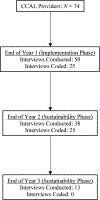A Qualitative Examination of a School-Based Implementation of Computer-Assisted Cognitive-Behavioral Therapy for Child Anxiety
- PMID: 34178162
- PMCID: PMC8223963
- DOI: 10.1007/s12310-021-09424-y
A Qualitative Examination of a School-Based Implementation of Computer-Assisted Cognitive-Behavioral Therapy for Child Anxiety
Abstract
Mental health treatment in schools has the potential to improve youth treatment access. However, school-specific barriers can make implementing evidence-based interventions difficult. Task-shifting (i.e., training lay staff to implement interventions) and computer-assisted interventions may mitigate these barriers. This paper reports on a qualitative examination of facilitators and barriers of a school-based implementation of a computer-assisted intervention for anxious youth (Camp Cope-A-Lot; CCAL). Participants (N = 45) included school staff in first through fourth grades. Providers attended a training in CCAL and received weekly, hour-long group consultation calls for three months. In the second year, the sustainability of CCAL use was assessed. Qualitative interviews were conducted after the first year (initial implementation) and second year (sustainability). Interviews were analyzed using the Consolidated Framework for Implementation Research domains to classify themes. Although participants reported that CCAL included useful skills, they expressed concerns about recommended session length (45 minutes) and frequency (weekly). Time burden of consultation calls was also a barrier. School staff facilitated implementation by enabling flexible scheduling for youth to be able to participate in the CCAL program. However, the sustainability of the program was limited due to competing school/time demands. Results suggest that even with computer assisted programs, there is a need to tailor interventions and implementation efforts to account for the time restrictions experienced by school-based service providers. Optimal fit between the intervention and specific school is important to maintain the potential benefits of computer-assisted treatments delivered by lay service providers in schools.
Keywords: Computer-assisted treatment; child anxiety; cognitive-behavioral therapy; implementation; schools.
Figures
References
Grants and funding
LinkOut - more resources
Full Text Sources

